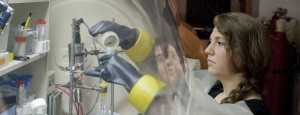Thirteen Alliance universities have joined forces to launch a new kind of doctoral training programme in response to industry needs and promote the UK’s economic growth and productivity.
The largest multi-partner and only nationwide doctoral training initiative of its kind – the Doctoral Training Alliance (DTA) – will be launched today (Thursday 24 September 2015) by University Alliance.
The DTA builds on the research strengths and industry-focused ethos of Alliance universities. It aims to produce independent, highly-employable researchers with the expertise and skills in strategically-important research areas.
The first DTA will be in Applied Biosciences for Health and will start in October 2015. It offers fully funded postgraduate programmes, an expert network of support and improved employment opportunities for PhD researchers.
Maddalaine Ansell, Chief Executive of University Alliance, said:
“Bioscience is a growing industry where the UK has a competitive advantage. The recent Research Excellence Framework results demonstrated that Alliance universities have real strength in bioscience and healthcare research.
“We hope our new DTA – which is the largest multi-partner, and only nationwide, doctoral training initiative of its kind – will give PhD students the expertise and skills that industry needs and contribute to the productivity of this sector.”
Professor Paul Harrison, Pro Vice-Chancellor for Research and Innovation, Sheffield Hallam University and DTA National Director, said:
“Alliance universities have always risen to the challenge of meeting industry needs. We’ve built this into the core of the DTA, by designing a training programme that responds to the demands of modern industry.
“DTA training combines vital research skills such as critical reasoning and epistemology with practical innovation and entrepreneurial expertise. It aims to produce postgraduate researchers who are job-ready and can apply the results of their excellent research to deliver real world impact.”
Professor Yvonne Barnett, Pro Vice-Chancellor for Research, Nottingham Trent University and DTA Director, Applied Biosciences for Health, said:
“The healthcare sector is a fast-moving, global market. The UK must commit to developing our world-leading research base to make sure we continue to be leaders in this field.
“Alliance universities understand this, and are investing in the next generation of researchers through the DTA in Applied Biosciences for Health. It brings together a range of exciting research projects from across the UK. The value to PhD students, supervisors and employers of this collaborative and multi-disciplinary learning environment will be huge.”
PhD students can apply for DTA programmes at one of 13 Alliance universities nationwide:
- Coventry University
- University of Greenwich
- University of Huddersfield
- Kingston University
- University of Lincoln
- Liverpool John Moores University
- Manchester Metropolitan University
- Nottingham Trent University
- Plymouth University
- University of Salford
- Sheffield Hallam University
- Teesside University
- UWE Bristol
Alliance universities educate 23% of all health undergraduates in the country and returned strong performances in the recent Research Excellence Framework (REF2014) accounting for 15% of the UK’s Allied Health research power. The 13 DTA partner institutions alone account for 12% of the UK’s research power in Allied Health.
Two PhD places will be offered at each institution on the programme. The DTA PhD students will form a cohort of 26 in the first year, 52 in the second year and grow to 78 over the three-year programme.
As well as benefitting from the world-class facilities, supervisors and support at their home institution, the PhD students will be joining a much broader community – where they can enjoy the collaborative power, expertise and reach of the Doctoral Training Alliance. They will be encouraged to share knowledge and collaborate via a new website – www.unialliance.ac.uk/dta – which has also been launched today.
The Doctoral Training Alliance will be launched at a high profile event at the Royal Society of Biology, London.





